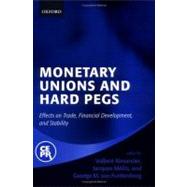Monetary Unions and Hard Pegs Effects on Trade, Financial Development, and Stability
, by Alexander, Volbert; Mélitz, Jacques; von Furstenberg, George M.- ISBN: 9780199271405 | 0199271402
- Cover: Hardcover
- Copyright: 6/3/2004
Financial services with global reach are becoming ever more important in the conduct and organization of the trade and investment of nations, and currencies that lack international standing lose out in this business. The result of financial development has been destabilizing currency andportfolio substitution -- in favour of international currencies and against local ones.This book analyses formal approaches to overcoming monetary divisions within countries and within integrating regions, focusing on the consequences of monetary union for trade among union members and their financial development and stability. The authors discuss hard pegs such as those attempted bythe currency board of Argentina, outright dollarization, such as in Ecuador, and multilateral monetary union, as in Europe, the least reversible form of monetary union and the most powerful elixir of financial integration and trade.The political classes and central banks in most countries have been reluctant to admit the market- and technology-driven forces of currency consolidation, much less yield to them. International financial institutions too are still in the habit of proffering advice about national monetary andexchange-rate policies on the assumption that getting rid of both is not even an option. Emerging-market countries, in particular, have to choose between retaining what independent monetary means they still have -- and can safely use in the presence of widespread liability dollarization and currencymismatches -- and formally replacing the domestic with an international currency to reduce exposure to debilitating financial crises. In concrete investigations of this choice, this volume shows that monetary union deserves a much more sympathetic hearing.






